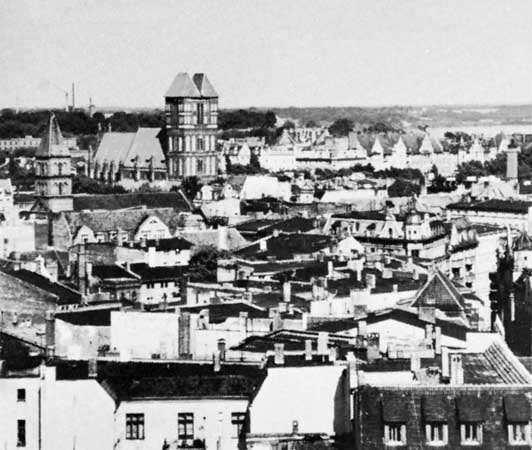Toruń
Poland
German Thorn
 city, one of two capitals (with Bydgoszcz) of Kujawsko-Pomorskie województwo (province), north-central Poland, on the Vistula River. A river port, rail and road junction, and cultural centre, it is the birthplace (1473) of the astronomer Nicolaus Copernicus (Copernicus, Nicolaus) (Mikołaj Kopernik) and the seat of Nicolaus Copernicus University (founded 1945), as well as several scientific societies, museums, and theatres. The 13th-century Church of St. John contains one of the largest bells in Poland. Other highlights of the historic city include the ruins of a Teutonic castle and the Gothic Church of Mary. Toruń's medieval legacy led UNESCO to designate it as a World Heritage site in 1997. Traditional industries include wool spinning and the baking of gingerbread; as a result of newer industrial development, Toruń has become known for its precision instruments, electronics, and synthetic fibre and textiles produced at the Elana factory.
city, one of two capitals (with Bydgoszcz) of Kujawsko-Pomorskie województwo (province), north-central Poland, on the Vistula River. A river port, rail and road junction, and cultural centre, it is the birthplace (1473) of the astronomer Nicolaus Copernicus (Copernicus, Nicolaus) (Mikołaj Kopernik) and the seat of Nicolaus Copernicus University (founded 1945), as well as several scientific societies, museums, and theatres. The 13th-century Church of St. John contains one of the largest bells in Poland. Other highlights of the historic city include the ruins of a Teutonic castle and the Gothic Church of Mary. Toruń's medieval legacy led UNESCO to designate it as a World Heritage site in 1997. Traditional industries include wool spinning and the baking of gingerbread; as a result of newer industrial development, Toruń has become known for its precision instruments, electronics, and synthetic fibre and textiles produced at the Elana factory.An important medieval trade centre, Toruń was ceded to the Teutonic Knights, who built a castle there (1230–31). The settlement acquired town rights in 1233, and the present city was laid out in 1236. During the 14th century Toruń joined the Hanseatic League and sailed its own merchant fleet in trade with the Netherlands. In 1454 Teutonic rule was overthrown, and in 1466 Toruń was declared a free city under Polish administration. It flourished through economic favours bestowed upon it by a succession of Polish kings. In 1793 it was seized by Prussia; it was returned to Poland in 1919. Pop. (2002) 211,243.
- Henry Crabb Robinson
- Henry Cromwell
- Henry Crown
- Henry Cuyler Bunner
- Henry Darwin Rogers
- Henry David Thoreau
- Henry Dearborn
- Henry de Bracton
- Henry Demarest Lloyd
- Henry de Montherlant
- Henry Deringer
- Henry Draper
- Henry Draper Catalogue
- Henry Dreyfuss
- Henry Drummond
- Henry Dumas
- Henry Duncan Graham Crerar
- Henry Dunster
- Henry Du Pré Labouchere
- Henry Edmund Holland
- Henry Edward Armstrong
- Henry Edward Manning
- Henry E. Huntington
- Henry Engelhard Steinway
- Henry Ernest Sigerist